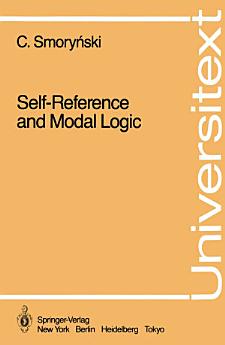Self-Reference and Modal Logic
ທ.ວ. 2012 · Springer Science & Business Media
4,0star
2 ຄຳຕິຊົມreport
ປຶ້ມອີບຸກ
333
ໜ້າ
reportບໍ່ໄດ້ຢັ້ງຢືນການຈັດອັນດັບ ແລະ ຄຳຕິຊົມ ສຶກສາເພີ່ມເຕີມ
ກ່ຽວກັບປຶ້ມ e-book ນີ້
It is Sunday, the 7th of September 1930. The place is Konigsberg and the occasion is a small conference on the foundations of mathematics. Arend Heyting, the foremost disciple of L. E. J. Brouwer, has spoken on intuitionism; Rudolf Carnap of the Vienna Circle has expounded on logicism; Johann (formerly Janos and in a few years to be Johnny) von Neumann has explained Hilbert's proof theory-- the so-called formalism; and Hans Hahn has just propounded his own empiricist views of mathematics. The floor is open for general discussion, in the midst of which Heyting announces his satisfaction with the meeting. For him, the relationship between formalism and intuitionism has been clarified: There need be no war between the intuitionist and the formalist. Once the formalist has successfully completed Hilbert's programme and shown "finitely" that the "idealised" mathematics objected to by Brouwer proves no new "meaningful" statements, even the intuitionist will fondly embrace the infinite. To this euphoric revelation, a shy young man cautions~ "According to the formalist conception one adjoins to the meaningful statements of mathematics transfinite (pseudo-')statements which in themselves have no meaning but only serve to make the system a well-rounded one just as in geometry one achieves a well rounded system by the introduction of points at infinity.
ການຈັດອັນດັບ ແລະ ຄຳຕິຊົມ
4,0
2 ຄຳຕິຊົມ
ໃຫ້ຄະແນນ e-book ນີ້
ບອກພວກເຮົາວ່າທ່ານຄິດແນວໃດ.
ອ່ານຂໍ້ມູນຂ່າວສານ
ສະມາດໂຟນ ແລະ ແທັບເລັດ
ຕິດຕັ້ງ ແອັບ Google Play Books ສຳລັບ Android ແລະ iPad/iPhone. ມັນຊິ້ງຂໍ້ມູນໂດຍອັດຕະໂນມັດກັບບັນຊີຂອງທ່ານ ແລະ ອະນຸຍາດໃຫ້ທ່ານອ່ານທາງອອນລາຍ ຫຼື ແບບອອບລາຍໄດ້ ບໍ່ວ່າທ່ານຈະຢູ່ໃສ.
ແລັບທັອບ ແລະ ຄອມພິວເຕີ
ທ່ານສາມາດຟັງປຶ້ມສຽງທີ່ຊື້ໃນ Google Play ໂດຍໃຊ້ໂປຣແກຣມທ່ອງເວັບຂອງຄອມພິວເຕີຂອງທ່ານໄດ້.
eReaders ແລະອຸປະກອນອື່ນໆ
ເພື່ອອ່ານໃນອຸປະກອນ e-ink ເຊັ່ນ: Kobo eReader, ທ່ານຈຳເປັນຕ້ອງດາວໂຫຼດໄຟລ໌ ແລະ ໂອນຍ້າຍມັນໄປໃສ່ອຸປະກອນຂອງທ່ານກ່ອນ. ປະຕິບັດຕາມຄຳແນະນຳລະອຽດຂອງ ສູນຊ່ວຍເຫຼືອ ເພື່ອໂອນຍ້າຍໄຟລ໌ໄໃສ່ eReader ທີ່ຮອງຮັບ.





